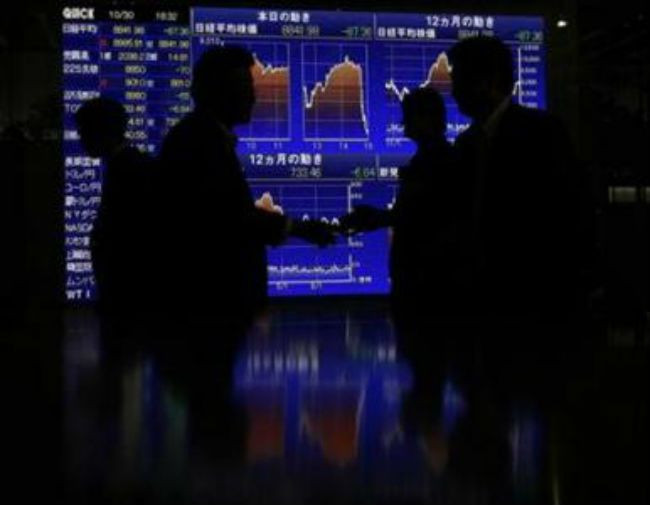
World shares were little changed Wednesday as policymakers in Europe reassured markets that a deal on releasing emergency aid toGreece was close, though the failure of lenders to come to an agreement on their own kept investors cautious.
Euro zone finance ministers, the International Monetary Fund and the European Central Bank will gather again Monday after nearly 12 hours of talks failed to produce a consensus on how to bring Greece's debts down.
After the meeting ended, French Finance Minister Pierre Moscovici said a deal was just "a whisker away," while European paymaster Germany said a plan to provide Greece with funding until 2016 was being developed.
Shares in Europe rebounded from early losses. The FTSEurofirst 300 .FTEU3index of top shares closed 0.3 percent higher while the Euro STOXX 50.STOXX50E rose 0.5 percent after dropping earlier. .EU
"European exchanges themselves are doing okay, so investors are saying 'we didn't really expect a resolution (on Greece),' just kind of learning to live with it," said Peter Jankovskis, co-chief investment officer at OakBrook Investments LLC in Lisle, Illinois.
U.S. stocks were little changed ahead of a national holiday Thursday for Thanksgiving. The Dow Jones industrial average .DJI was up 30.49 points, or 0.24 percent, at 12,819.00. The Standard & Poor's 500 Index .SPX was up 0.55 points, or 0.04 percent, at 1,388.36. The Nasdaq Composite Index .IXIC was up 2.96 points, or 0.10 percent, at 2,919.65.
Investors in the U.S. digested the latest data, including weekly jobless claims that met expectations and a final read on November consumer sentiment that was below forecasts.
The benchmark 10-year U.S. Treasury note was down 8/32, with the yield at 1.6933 percent.
The euro was flat at $1.282, also rebounding from earlier weakness of as much as 0.5 percent.
Prices for German debt, the safest in the euro zone, had eased slightly, sending 10-year yields down modestly to 1.45 percent.
However, a sale of 3.25 billion euros ($4.2 billion) of new German 10-year debt, which paid an interest rate of 1.5 percent, drew solid demand from investors worried about the outlook.
FED WARNING
Before the Greek impasse, world equity markets had come under pressure by a warning Tuesday from Federal Reserve Chairman Ben Bernanke that the central bank lacked the tools to cushion the impact of a potential U.S. fiscal crisis.
Bernanke said worries over fiscal negotiations, aimed at preventing a series of mandatory tax increases and spending cuts early next year, had already damaged growth in the world's largest economy.
His comments snapped a two-day rally on Wall Street Tuesday, but the MSCI world equity index .MIWD00000PUS later rose 0.1 percent.
Asian shares had initially fallen in reaction to the Greek aid payment delay, but recovered to close slightly higher due to a rise in mainland Chinese markets and in Tokyo.
MSCI's broadest index of Asia-Pacific shares outside Japan .MIAPJ0000PUS gained 0.2 percent, while Japan's Nikkei stock average .N225 closed up 0.9 percent at a two month-high.
YEN WEAKNESS
The Nikkei's gains came as shares of exporters rose, after the yen hit a seven-month low against the dollar, on expectations a new government will aggressively push the Bank of Japan to expand monetary stimulus.
Japan's opposition Liberal Democratic Party, tipped to win next month's general election, also promised to boost spending as it emerged that exports had fallen in annual terms for a fifth straight month in October.
The yen rose 0.8 percent to the dollar, bouncing off its weakest level since early April. The U.S. dollar .DXY was flat against a basket of currencies, while Brent crude rose 0.5 percent.
Oil was supported in the wake of an explosion on a bus in Tel Aviv, Israel, on fears that clashes between Gaza and Israel could lead to a wider regional conflict that would disrupt oil flows.
"There are opposing forces where the uncertainty in Europe and the United States meets with the bullish uncertainty in the Middle East ... so I think we're going to see a volatile market," said Jeremy Friesen, commodity strategist at Societe Generale in Hong Kong.
© Thomson Reuters.




